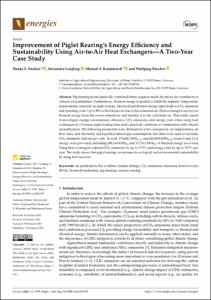Improvement of Piglet Rearing's Energy Efficiency and Sustainability Using Air-to-Air Heat ExchangersA Two-Year Case Study

Improvement of Piglet Rearing's Energy Efficiency and Sustainability Using Air-to-Air Heat Exchangers
A Two-Year Case Study

| dc.contributor.author | Deeken, Hauke | |
| dc.contributor.author | Lengling, Alexandra | |
| dc.contributor.author | Krommweh, Manuel | |
| dc.contributor.author | Büscher, Wolfgang | |
| dc.date.accessioned | 2023-05-02T09:38:21Z | |
| dc.date.available | 2023-05-02T09:38:21Z | |
| dc.date.issued | 11.02.2023 | |
| dc.identifier.uri | https://hdl.handle.net/20.500.11811/10819 | |
| dc.description.abstract | Pig farming in mechanically ventilated barns requires much electricity for ventilation or exhaust air purification. Furthermore, thermal energy is needed to fulfill the animals’ temperature requirements, especially in piglet rearing. Electrical and thermal energy input leads to CO2 emissions and operating costs. Up to 90% of heat losses are due to the exhausted air. Heat exchangers can recover thermal energy from the warm exhaust air and transfer it to the cold fresh air. This study aimed to investigate energy consumption, efficiency, CO2 emissions, and energy costs when using heat exchangers in a German piglet rearing barn under practical conditions in combination with exhaust air purification. The following parameters were obtained for a two-year period: air temperatures, air flow rates, and electricity and liquefied natural gas consumption; the latter were used to calculate CO2 emissions and energy costs. In total, 576,042 kWhel,th and 616,893 kWhel,th (years 1 and 2) of energy were provided, including 290,414 kWhth and 317,913 kWhth of thermal energy recovered. Using heat exchangers reduced CO2 emissions by up to 37.5% and energy costs by up to 19.7% per year. The study shows that piglet rearing can increase its ecological and environmental sustainability by using heat recovery. | en |
| dc.format.extent | 30 | |
| dc.language.iso | eng | |
| dc.rights | Namensnennung 4.0 International | |
| dc.rights.uri | http://creativecommons.org/licenses/by/4.0/ | |
| dc.subject | air purification | |
| dc.subject | bio scrubber | |
| dc.subject | climate change | |
| dc.subject | CO2 emissions | |
| dc.subject | emissions | |
| dc.subject | heat recovery | |
| dc.subject | HVAC | |
| dc.subject | livestock husbandry | |
| dc.subject | pig farming | |
| dc.subject | resource-saving | |
| dc.subject.ddc | 630 Landwirtschaft, Veterinärmedizin | |
| dc.title | Improvement of Piglet Rearing's Energy Efficiency and Sustainability Using Air-to-Air Heat Exchangers | |
| dc.title.alternative | A Two-Year Case Study | |
| dc.type | Wissenschaftlicher Artikel | |
| dc.publisher.name | MDPI | |
| dc.rights.accessRights | openAccess | |
| dcterms.bibliographicCitation.volume | 2023, vol. 16 | |
| dcterms.bibliographicCitation.issue | iss. 4 | |
| dcterms.bibliographicCitation.pagestart | 1 | |
| dcterms.bibliographicCitation.pageend | 30 | |
| dc.relation.doi | https://doi.org/10.3390/en16041799 | |
| dcterms.bibliographicCitation.journaltitle | Energies | |
| ulbbn.pubtype | Zweitveröffentlichung | |
| dc.version | publishedVersion | |
| ulbbn.sponsorship.oaUnifund | OA-Förderung Universität Bonn |
Dateien zu dieser Ressource
Das Dokument erscheint in:
-
Publikationen (5)




